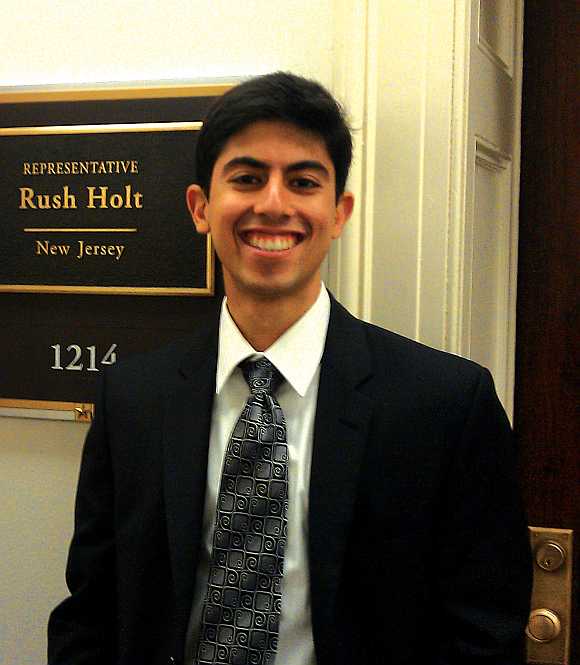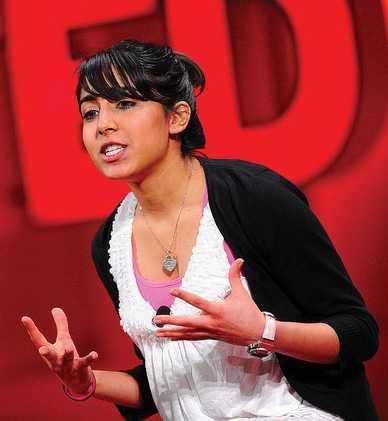Arthur J Pais profiles this year's Truman Scholars
The civic scientist
When we are young many of us think that nothing bad will ever happen to us, and we are not prepared for handling serious health problems," says Rahul Rekhi, a Rice University, Houston bioengineering and economics major. "And when illness strikes us, we often do have adequate information on what to do, where to go and how to handle various issues related to it."
These thoughts led Rahul to pair with the non-profit Young Invincibles to distribute healthcare materials to more than 300,000 college seniors. The national organisation was started in 2009 to ensure young people's voices were heard in the debate over healthcare reform. Rahul was also impressed to read on the Young Invincibles Web site stories of over 1,200 young Americans from around the country who said they were not invincible without healthcare.
"I had to contribute to creating more awareness," Rekhi says, adding that the material he gathered and edited had to be succinct and up to date.
Rekhi and Sejal Hathi of California, who is studying at Yale University, are among the 54 Truman Scholars for 2012. They will attend in May a leadership development programme at William Jewell College in Liberty, Montana, and receive their awards in a special ceremony at the Truman Library in Independence, Montana.
The Truman Scholarship Foundation was established by Congress in 1975. The scholarship is given to American college students with outstanding leadership potential and communication skills. A Truman Scholarship provides up to $30,000 for graduate study.
Rekhi says his goal as a public servant is singular: To serve as a civic scientist. After graduation, he plans to pursue a PhD in bioengineering and a master's in public policy so "I can work at the nexus of science, health and policy as both a biomedical researcher and a national policymaker."
Rekhi won a Rice Envision Grant and a Community Service Grant to create the Research Mentorship Initiative, which pairs underserved students at Houston school on research projects with Rice undergraduates. He was also among the 275 American students named 2011 Goldwater Scholars. He has conducted research on the computer modelling of angio-genesis under the direction of bioengineering Assistant Professor Amina Qutub at Rice since his freshman year. He is second author on papers submitted to Nature Biotechnology and to Science and has presented at national conferences. He serves as an editor of the Rice undergraduate science journal, Catalyst, and his bioengineering design team has a provisional/pending patent on a cellphone-based bilirubinometer.
His career plans were strengthened when he worked at the National Science Foundation last summer as a Baker Institute/Rice Center for Engineering Leadership DC intern, he says. "This unique experience in tackling science and technology policy issues at the federal level was profoundly rewarding," he says. "It helped me realise that my broader social mandate as a bioengineer is not just to discover and design treatments in the lab, but also to help make those technologies broadly accessible, affordable and in sync with public policy. This, I believe, is my civic duty, and the Truman helps give me a chance to act on it."
As part of the Truman competition, he was asked to describe a recent act of public service that has given him the most satisfaction. He wrote about reading a much-publicised report by US Senator Tom Coburn decrying 40 government-sponsored scientific studies including one that involved running shrimp on a treadmill.
The video of this experiment became a sensation on YouTube, Rahul wrote. But he did not want to take the senator's views for granted. So he began poring over the studies of the experiments and was convinced that the neural pathway that affects shrimp mobility can help science to treat neurological disorders in thousands of Americans and people across the world.
The senator's lack of understanding of how science works made him speak against such experiments, Rahul concluded. So the Rice student started an endeavour to talk to lawmakers and their staff and bring to their attention the validity of studies and experiments that may look like a waste of resources and time to some.
The dialogue and discussions made it clear to him, he says, that he "cannot fulfill my mandate as a biomedical scientist unless I take up the policy mantle along my research career and ensure that my work reaches the public I intend to serve."
Rekhi is also big on campus activism. He and Raj Salhotra are presidents of Rice Young Democrats.
The social entrepreneur
Image: Sejal HathiSejal Hathi, a Yale University student and social entrepreneur, has launched a Web site to collect stories of 100,000 women activists across the world.
'I am inspired by women like Jasmeen Patheja, who as a college student in Kolkata, India transformed personal threats of eve-teasing into a nationwide call to action -- founding the burgeoning network of activists and artists, The Blank Noise Project,' Hathi recently wrote in The Huffington Post. 'I am moved by young women like Inna Hudaya from Yogyakarta, Indonesia, who after suffering her own botched abortion, birthed grassroots non-profit Samsara to provide pre- and post-abortion counselling, reproductive rights trainings, and sex education classes to women and girls facing unwanted pregnancies.'
One of the 54 recently-selected Truman Scholarships awardees, Hathi, who grew up in Fremont, California, founded Girls Helping Girls, a non-profit that works with other non-governmental organisations in 22 countries to empower girls socially and economically. She is also the co-founder of Girltank, which supports young women social entrepreneurs globally to bring their ventures to sca#8804 and S2 Capital, a micro social venture fund that invests in young entrepreneurs in low-resource countries.
Now, she wants to chronicle the success stories of hundreds of young women.
"Getting the world to know of teenage girls and young women who are making an impact is my latest project," she says. "In partnership with MTV Voices, we have launched a worldwide search to find 10,000 young women who are promoting powerful ideas and spearheading bold efforts to solve challenges in their communities. We want to share these girls' stories, to illustrate how brilliantly and creatively they are bringing about social changes."
Hathi, the only child of an engineer and a mother who is an immigration attorney, thinks her social activism started when she was around nine years old. "Going to a temple with my parent involved much more than praying," she says. "I was encouraged to look around and get involved in community activities. I learned very early on in my life that I enjoyed embracing service as a life long goal. I have learned things a hard way and now I know goodwill alone is not enough and my team physically visits the work that is being carried out with our assistance and makes sure everything is above board.
Hathi, who is studying biotechnology and global health, remembers collecting $3,000 for a project in Ghana and her father asking her several times if the money would be well used. "Nevertheless I wired the money abroad only to discover months later it was not well used," she said. "I was 16, and in four years, I have become much more active but also very cautious."
She has served as a USA ambassador to the international NGO Ashoka and an adviser on youth development and women and girls to multiple organisations, from the World Bank to UNICEF to State Farm Insurance. She has also been named a World Economic Forum Global Shaper, one of Newsweek's 150 Women Who Shake the World, one of CNN's Young People Who Rock, and one of Glamour's Amazing Young Women of the Year.
Two years ago, she worked with the Yale Global Health Leadership Institute and the National Bank of Egypt to design and implement a data-driven hospital strengthening project in Cairo ago. The following summer, Sejal interned in Mountain View at genetics company 23andMe.
It took her and a partner over six months to start S2 Capital, which invests in social entrepreneurs under the age of 30 in the developing world.
"We work with a number of well established NGOs," she says. "Uniquely the entrepreneurs that we invest in become our partners in sourcing new portfolio companies, thus implementing a pay-it-forward scheme in which entrepreneurs partner with investors to quest, cull, and highlight the next best examples of innovation."
When she went to India to launch the pilot programme, she had planned to invest exclusively in the 'missing middle' -- providing between $25,000 and $250,000 of growth capital to enterprises too big for microfinance and too small for traditional venture capital firms, she says.
Soon, she and her partner realised that raising those amounts of money is extremely difficult, especially in the current global financial environment. 'But perhaps more importantly, after meeting with several of the social entrepreneurs themselves,' she wrote in an essay, 'we realised that another tremendous gap in the social change ecosystem was India's young people, who -- despite living in the country home to perhaps the highest number of social entrepreneurs in the world -- are exposed to few if any resources on development through enterprise: how to innovate market-based approaches to eliminating poverty.'
She then decided to shift the focus to cultivating, supporting, and investing in specifically young people with the potential for launching and scaling social ventures. She worked on to invest for the first three years on India and invested only up to $15,000 -- up to $50,000 with co-investors -- in four to five youth-run enterprises per year.



Comment
article